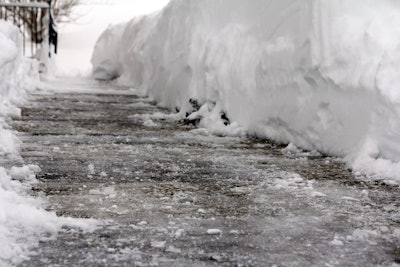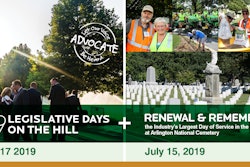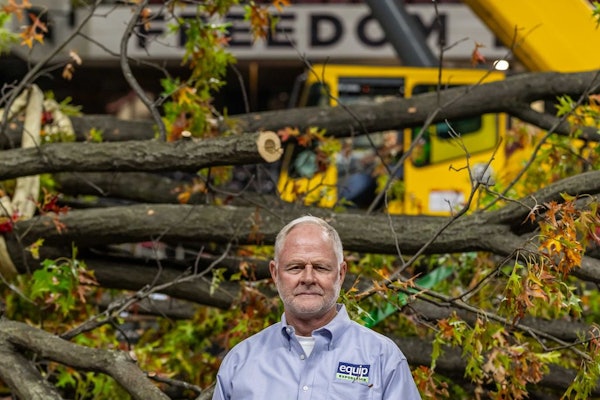
One topic that was offered on Thursday, June 27, was called “Tales from the Witness Stand: What You Sign and Say Can Cost You in Court.”
Veteran snow and ice professional and president of Snow and Ice Solutions Inc., Chris James, hosted this presentation, sharing how professional landscapers can avoid or address slip and fall liability.
James’ business, Chris James Landscaping Inc., based in Waldwick, New Jersey, has handled snow and ice management for commercial properties for 38 years and for 35 years CJL went without a slip and fall suit.
James says that slip and fall lawsuits have become increasingly popular, as they are easy suits for lawyers to pursue. You might think that a majority of the claims must be false but James says 95 percent of the time the cases are, indeed, true.
“Reality is, when it comes to soft tissue, a person can really be hurt, whether they look like it or not,” he says.
Despite it being more likely your landscaping company could get sued at some point for a slip and fall case, James stresses it’s still important to care and work hard to avoid having this happen.
Not only are these cases a waste of time and money, your company can lose primary market coverage and your case reflects poorly on the industry as a whole.
“We have a duty to ourselves, but also a duty to our industry,” he says.
He explained that people can get seriously injured and even die in some cases.
The first key to avoid these sorts of situations is to not sign a bad contract with unrealistic or vague expectations. James says landscapers should learn to say no and walk away from bad contracts or negotiate a fair deal.
“Have your attorney review it first,” he says. “Send it to your insurance agent and have them send it to their underwriter.”
An effective snow and ice control program requires a well thought-out, written plan and policy. When there is a solid plan in place, managers must plan ahead, and maintenance workers are clear on what is expected of them. This plan also minimizes liability and ensures the customer is aware of what the company is responsible so there are fewer complaints.
James encourages landscape contractors to be diligent in documenting their work. Keeping reliable records provides valuable defense proof in the case of a suit, as well as serve as an accountability tool for managers and supervisors. These records also help with providing data as to the efficiency and effectiveness of operations.
“Basically, in our industry, if it doesn’t get written down it can be very hard to prove something is done,” James says. “I want to document when we started and where we started. It’s very hard for the plaintiff’s attorney to dispute that.”
If you do find yourself having to deal with a slip and fall lawsuit, James says to immediately start a file for it as this could take two to three years before the matter is settled.
“From the get-go, only you have your best interest at heart,” he says.
After being served, everything should go through your attorney and you should never talk to the opposing council, no matter how friendly they seem. One thing that is important to know is where the plaintiff fell. For instance, if the victim fell on a sidewalk, yet your company is only responsible for clearing the parking lots, your company is not liable.
James says if you feel you have a strong case, ask your attorney to request a summary judgement. A summary judgement is judgment entered by a court for one party and against another party without a full trial.
If you end up going to trial, James says it is important to listen to your attorney, as they will know how the opposing council plans to attack you. When the lawyers ask questions, respond directly and only to the question asked. Do not provide additional information and listen to the entire question before responding.
“This isn’t speed dating,” he says. “Take a deep breath. Don’t assume you know where the question is going. You can say you don’t remember and need you check your paperwork.”
Many times the questions will be yes or no. If you cannot answer the question with a yes or no, tell them that it’s not a yes or no question.
“Make the lawyer work,” James says. “If they ask, ‘Is the ice slippery?’ Ask, ‘In what context?’”
Other tips for going to trial are to dress the part, but don’t overdress. Look at the jury members in the eye and speak clearly and confidently. If your lawyer objects to a question, stop talking and wait for the judge to rule.
Elements that will hurt your case include not having any written records, logs or GPS tracking of your past work, not training your staff and not having a knowledge of snow and ice management. Others are not knowing where your service obligations end, not having a trigger to start mechanical removal or admitting to crews working 24, 36 or 48 hours straight.
It eventually comes back to having clear expectations set in the contract. James says snow and ice contractors should avoid guaranteeing 24/7 continuous snow and ice management, as it simply isn’t doable.
Outline to customers that certain services such as plowing, shoveling, anti-icing or de-icing will not necessarily result in bare pavement and slippery conditions may still prevail after services have been carried out.
James say that in his company’s contracts they make sure the customer cannot hold them responsible for any shortages in ice melt materials. Clients are also required to hold the company harmless from any and all liabilities if they place limits on any service recommended by the company.
In per-push snow plowing contracts, make it clear that it will take varying amounts of visits and time to complete each service based on the length, timing and severity of each snow event.
At the end of the day, if you cannot negotiate a fair, equitable agreement that meets reasonable industry standards, a reasonable level of service and that is profitable for your company, you must decide to say “No, thank you,” to certain contracts.
“We are in the risk vs. reward business,” James says. “If the reward is not worth the risk then don’t do it.”









